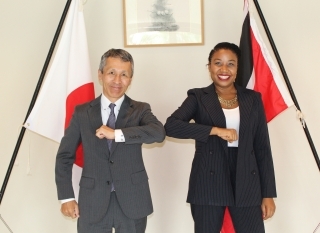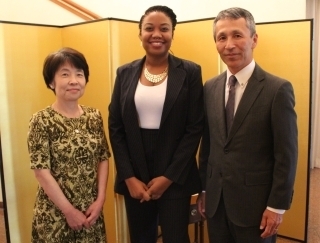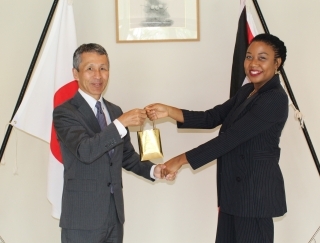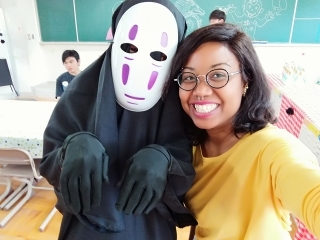JET Programme Series: A Risk Worth Taking - Avah Atherton
2022/5/16



JET Programme Series: A Risk Worth Taking - Avah Atherton


Donkey years ago, when I was in high school, I was introduced to Japanese pop culture by my friends. It wasn't hard for me to become deeply engrossed in it since languages and cultures were already two of my biggest passions. This interest continued all throughout college when I started the first anime club in COSTATT and then in UWI when I started the East Asian Culture Club (EACC). Along the way, I cosplayed at local anime conventions, hosted maid cafes, and generally made, what I now consider to be, a whole fool of myself up and down the East-West corridor.
When I found out about the JET Program, it was a no-brainer for me to apply. Of course moving to Japan made sense. I had studied Japanese for one year at CLL. What more yuh go want? Had I ever lived or travelled abroad? No but daiz nothing, I told myself, what doh kill does fatten. So, two months after I finished my degree, I was on a plane heading to a city called Hamamatsu in Shizuoka, Japan.
For the first year, I was a hot mess, no lie. I missed my trains, I bepped in the staffroom, I mispronounced everyone's name, and I frightened unsuspecting old ladies who certainly weren't expecting someone like me telling them good morning. By year two, I felt a little more settled and less overwhelmed. I had moved to a new apartment, dealt with my loneliness plus made local and foreign friends. I took Japanese cooking classes, hosted a few Trini ones at my apartment, threw fetes, and travelled all over Asia.
Year three, I was big in d dance even if the dance was just in my apartment. I had two schools, a low-level English school and a special needs school in the bush that was full of truly lovely and welcoming people. In my town, where there was a small foreigner population, it was easy to get roped into events and activities. From all-you-can-eat events with strawberries, grapes or even bbq, fireworks festivals, to tea ceremonies and traditional drumming. My glad bag had buss.
But there was a sense of discontent that I couldn’t shake. And no matter how I tried to compensate, I knew one thing was certain. After three years of not seeing my family, missing my culture while trying to survive in someone else’s, dealing with a foreign language on a constant basis, and having very little positive reinforcement about my heritage, I realised one thing: I had to come home.
Back home, I went through a long period of reverse culture shock. The things I love about Trinidad, I wish Japanese people would adopt. And the things I love about Japan, I really wish we could adopt. The cognitive dissonance I often felt in comparing them finally began to fade. Having experienced both worlds, I began to deeply appreciate their differences as well as come to terms with their similarities.
I joined the JET Alumni Association (JETAATT) in the year of our Lord two thousand and COVID to maintain my relationship with the Japanese people here. I continued doing language exchanges with my Japanese friends and I even had a Zoom meeting with my old students in Japan before they graduated. Through the various activities of the JETAATT, I was able to vicariously enjoy the interest and excitement of applicants interested in the JET program. All the while contemplating my own return to a place I had unconsciously begun to consider home.
When I applied to the JET Program again, I was more nervous than I was the first time. All the things I had come to terms with felt theoretical and putting it into practice required a huge sacrifice. So when I received word of my acceptance, I felt both immense joy and sorrow. Because nothing compares to Trinidad and Tobago. The same way nothing compares to Japan. This line from the anime Haikyuu perfectly sums up my feelings: There are some flowers you only see when you take detours. Whether the flower is a chaconia or a cherry blossom, this holds true for me.
So your question might be, "why go back at all?" My answer is simple: freedom. The freedom to learn, grow, change, and adapt. Every single human being deserves and I believe, needs that freedom. It can only come from challenging yourself in as many ways as possible. Like living, breathing, and existing in a new environment. While there are so many things that make living in Japan very easy, moving there will be the hardest thing you might ever do. And I am choosing to do it again. Because, I can say without a shadow of a doubt, the benefits outweigh the risks. And Japan is a risk entirely worth taking.
JET Series: A Risk Worth Taking (Japanese Embassy's Facebook)
JET Programme Series Archives
When I found out about the JET Program, it was a no-brainer for me to apply. Of course moving to Japan made sense. I had studied Japanese for one year at CLL. What more yuh go want? Had I ever lived or travelled abroad? No but daiz nothing, I told myself, what doh kill does fatten. So, two months after I finished my degree, I was on a plane heading to a city called Hamamatsu in Shizuoka, Japan.
For the first year, I was a hot mess, no lie. I missed my trains, I bepped in the staffroom, I mispronounced everyone's name, and I frightened unsuspecting old ladies who certainly weren't expecting someone like me telling them good morning. By year two, I felt a little more settled and less overwhelmed. I had moved to a new apartment, dealt with my loneliness plus made local and foreign friends. I took Japanese cooking classes, hosted a few Trini ones at my apartment, threw fetes, and travelled all over Asia.
Year three, I was big in d dance even if the dance was just in my apartment. I had two schools, a low-level English school and a special needs school in the bush that was full of truly lovely and welcoming people. In my town, where there was a small foreigner population, it was easy to get roped into events and activities. From all-you-can-eat events with strawberries, grapes or even bbq, fireworks festivals, to tea ceremonies and traditional drumming. My glad bag had buss.
But there was a sense of discontent that I couldn’t shake. And no matter how I tried to compensate, I knew one thing was certain. After three years of not seeing my family, missing my culture while trying to survive in someone else’s, dealing with a foreign language on a constant basis, and having very little positive reinforcement about my heritage, I realised one thing: I had to come home.
Back home, I went through a long period of reverse culture shock. The things I love about Trinidad, I wish Japanese people would adopt. And the things I love about Japan, I really wish we could adopt. The cognitive dissonance I often felt in comparing them finally began to fade. Having experienced both worlds, I began to deeply appreciate their differences as well as come to terms with their similarities.
I joined the JET Alumni Association (JETAATT) in the year of our Lord two thousand and COVID to maintain my relationship with the Japanese people here. I continued doing language exchanges with my Japanese friends and I even had a Zoom meeting with my old students in Japan before they graduated. Through the various activities of the JETAATT, I was able to vicariously enjoy the interest and excitement of applicants interested in the JET program. All the while contemplating my own return to a place I had unconsciously begun to consider home.
When I applied to the JET Program again, I was more nervous than I was the first time. All the things I had come to terms with felt theoretical and putting it into practice required a huge sacrifice. So when I received word of my acceptance, I felt both immense joy and sorrow. Because nothing compares to Trinidad and Tobago. The same way nothing compares to Japan. This line from the anime Haikyuu perfectly sums up my feelings: There are some flowers you only see when you take detours. Whether the flower is a chaconia or a cherry blossom, this holds true for me.
So your question might be, "why go back at all?" My answer is simple: freedom. The freedom to learn, grow, change, and adapt. Every single human being deserves and I believe, needs that freedom. It can only come from challenging yourself in as many ways as possible. Like living, breathing, and existing in a new environment. While there are so many things that make living in Japan very easy, moving there will be the hardest thing you might ever do. And I am choosing to do it again. Because, I can say without a shadow of a doubt, the benefits outweigh the risks. And Japan is a risk entirely worth taking.
JET Series: A Risk Worth Taking (Japanese Embassy's Facebook)
JET Programme Series Archives
